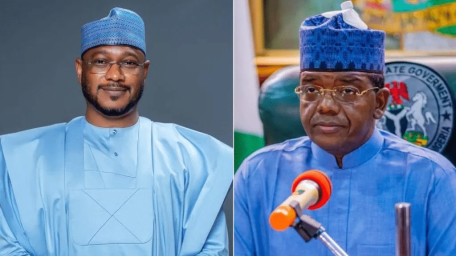Dr. Bello Matawalle, the Minister of State for Defence, has vehemently denied accusations of supporting banditry in Zamfara State. The allegations, leveled by current Zamfara Governor Dauda Lawal and echoed by wanted bandit kingpin Bello Turji, have ignited a fierce debate about security and governance in the troubled northwestern region.
The controversy erupted when Governor Dauda Lawal publicly accused Matawalle, his predecessor, of being a key figure behind the ongoing banditry crisis in Zamfara State. This bold claim was soon followed by a video from Bello Turji, a notorious bandit leader, who alleged that Matawalle’s policies during his tenure as governor had directly contributed to the escalation of violence in the region.
In response to these allegations, Matawalle’s office issued a strongly worded statement through his media consultants, Lambert and Curtis. Dayemi Saka, Lead Partner at the firm, described the accusations as “baseless, malicious, unfounded, mischievous and deliberate concocted lies” against the Minister.
“We are not unmindful of the sustained attacks on the person, integrity, and patriotic sense of duty of our client,” Saka stated, highlighting the political nature of the conflict.

Supporters of Matawalle point to his efforts as Governor of Zamfara State between 2019 and 2023 as evidence of his commitment to combating banditry. According to the statement, Matawalle’s administration “saw banditry and all other sundry of criminality tackled head-on.
A key point of contention is Matawalle’s approach to dealing with bandits. The statement emphasizes his “demonstration of the strength of character by insisting he was not going to negotiate with Bandits after the closure of the amnesty window for them to lay down their arms.” One of the most serious allegations relates to the handling of surrendered weapons. Matawalle’s team asserts that “All arms seized, recovered, and received from bandits were submitted at Government House Gusau, and there is a record for it.
They further clarify that “The Government House does not have armoury, and it is also on record that the cache of arms was handed over to relevant security agencies of government.” This statement directly contradicts claims that Matawalle’s administration improperly retained or redistributed seized weapons.
The video statement by Bello Turji, the wanted bandit kingpin, has added a layer of complexity to the situation. Turji claims that Matawalle’s policies as governor directly contributed to the rise of banditry in the region.
Any person living in Shinkafi, Zurmi (Zamfara State) and Isa (Sokoto State) cannot deny this claim,” Turji asserted in the video. He went on to allege that Matawalle had “pampered” certain bandit groups, even hosting them at the Government House without requiring them to surrender their weapons.
This political clash unfolds against the backdrop of ongoing security challenges in Zamfara and neighboring states. The region has long grappled with banditry, kidnapping, and other forms of violence, affecting the lives of countless civilians.
Dr. Abubakar Sani, a security analyst based in Abuja, provides context: “The situation in northwest Nigeria is complex, with historical, economic, and social factors contributing to the rise of banditry. While it’s crucial to hold leaders accountable, we must also recognize the multifaceted nature of this crisis.
The allegations against Matawalle have sparked intense debate among Nigerians, particularly on social media platforms. Some view the accusations as politically motivated, while others see them as a necessary step towards accountability.
Fatima Ibrahim, a civil society activist in Gusau, expressed frustration shared by many locals: “We’re tired of the blame game. What we need is concrete action to improve security and livelihoods in our communities.
As the controversy continues to unfold, there are growing calls for a thorough, independent investigation into the allegations. The Nigeria Police Force and other security agencies have yet to comment publicly on the matter.
Senator Ahmed Yarima, a prominent political figure from Zamfara, urged caution: “These are serious allegations that require careful examination. We must not rush to judgment but allow due process to take its course.”
In the meantime, the people of Zamfara and neighboring states continue to grapple with the daily realities of insecurity and economic hardship. As this political drama plays out in the media and corridors of power, many are hoping for concrete solutions to the long-standing challenges facing the region.
The coming weeks are likely to bring further developments in this high-stakes political and security saga, with potential implications for Nigeria’s broader efforts to combat banditry and restore peace to its troubled northwestern region.



